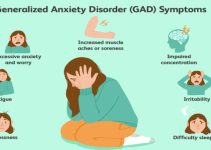Psychological Impact, encompassing a wide range of long-term illnesses such as diabetes, heart disease, chronic pain, and mental health disorders, have significant impacts not only on the physical health of individuals but also on their psychological well-being. This article explores the various psychological effects of living with chronic conditions and discusses strategies for managing these impacts effectively.

Psychological Impact
Contents
Understanding the Psychological Burden
Chronic illnesses can lead to profound changes in an individual’s life, altering their daily routines, long-term plans, and self-identity. These changes often come with a psychological toll that includes:
- Anxiety and Depression: Many people with chronic conditions experience heightened levels of anxiety and depression. The uncertainty about the progression of the disease, concerns about treatment efficacy, and fear of dependency can all contribute to these feelings.
- Stress: Managing a chronic illness often requires significant adjustments, from adhering to complex medication regimens to frequent medical appointments. The ongoing need to manage these tasks, along with the financial implications, can lead to chronic stress.
- Isolation and Loneliness: Physical symptoms and mobility limitations can reduce social interactions, leading to feelings of isolation and loneliness. These feelings are compounded if the condition involves a stigma, such as certain mental health disorders or HIV/AIDS.
- Grief and Loss: Individuals may grieve the loss of their health and the life they had before their illness. This grief can be cyclical, with new losses felt as the disease progresses or as different areas of life are affected.
- Impact on Self-Esteem and Self-Image: Chronic conditions can affect how individuals see themselves and their future, often feeling that they have lost a part of their identity or are no longer able to fulfill the roles they once held.
Strategies for Managing Psychological Impacts
Addressing the psychological effects of chronic conditions is crucial for improving quality of life and can also positively influence physical health outcomes. Here are some strategies that can help:

Psychological Impact
- Professional Support: Consulting with psychologists or counselors who specialize in chronic illness can help individuals develop coping strategies. Cognitive-behavioral therapy (CBT) and other therapeutic approaches can be particularly effective in addressing depression and anxiety.
- Support Groups: Joining a support group where members share similar experiences can alleviate feelings of isolation. These groups provide a safe space to share challenges and learn from others who are facing similar struggles.
- Mindfulness and Relaxation Techniques: Practices such as meditation, yoga, and deep-breathing exercises can reduce stress and improve mental health. These techniques help individuals focus on the present moment and reduce overwhelming feelings about the future.
- Healthy Lifestyle Choices: Regular physical activity, a nutritious diet, and adequate sleep are essential for mental health. Even moderate exercise can elevate mood and decrease anxiety.
- Education and Advocacy: Understanding one’s condition and being an advocate for one’s own care empowers individuals, helping to regain a sense of control. Education about the condition can also reduce fears and misconceptions.
The psychological impact of chronic conditions is complex and multifaceted, influencing nearly every aspect of life. Acknowledging and addressing these psychological effects is as important as managing the physical symptoms. With the right support and strategies, individuals living with chronic conditions can lead fulfilling lives, despite the challenges posed by their health issues.
Exploring the Advantages and Disadvantages of the Psychological Impact of Life Events
Life events, ranging from significant milestones such as marriages and births to challenges like job loss or the death of a loved one, can have profound psychological impacts. While the term “psychological impact” often carries wdbos a negative connotation, these experiences can also foster personal growth and resilience. This article delves into both the advantages and disadvantages of the psychological impacts associated with life events.

Psychological Impact
Advantages of Psychological Impacts
- Personal Growth: Challenging life events, while difficult, can lead to significant personal growth. Individuals often develop new skills, greater self-awareness, and better coping strategies that enhance their ability to manage future challenges. This growth is frequently referred to as post-traumatic growth, where people report improvements in areas such as personal strength and appreciation of life.
- Increased Resilience: Experiencing and overcoming adversity can increase resilience, making individuals better equipped to handle future stresses. This enhanced resilience can contribute to a more robust psychological and emotional state that benefits all areas of life.
- Improved Relationships: The psychological impact of life events can lead to deeper connections with others. Shared struggles often strengthen bonds, fostering empathy and support among family members, friends, and communities.
- Greater Empathy and Compassion: Going through significant life events can increase one’s empathy and compassion for others experiencing similar difficulties. This can lead to more supportive social interactions and a greater willingness to help others.
Disadvantages of Psychological Impacts
- Mental Health Risks: Life events can lead to or exacerbate mental health issues such as anxiety, depression, and post-traumatic stress disorder (PTSD). The strain of adapting to a major life change can be overwhelming, and without adequate support, can lead to long-term psychological difficulties.
- Chronic Stress and Physical Health Decline: Psychological stress can also impact physical health. Chronic stress can contribute to problems like heart disease, diabetes, and a weakened immune system. Moreover, the mental strain can lead to unhealthy coping mechanisms such as substance abuse, which further deteriorates health.
- Social Withdrawal: Some individuals react to the psychological impact of life events by withdrawing socially. This isolation can exacerbate feelings of loneliness and depression, creating a cycle that is difficult to break.
- Cognitive Impairments: High levels of stress and emotional turmoil can affect cognitive functions such as memory, concentration, and decision-making. This can impact an individual’s ability to perform at work or manage daily tasks.
Coping Mechanisms and Support Systems
Effectively managing the psychological impacts of life events involves recognizing the need for help and utilizing available resources. Key strategies include:
- Seeking Professional Help: Therapy can provide the tools to process and cope with emotions constructively. Mental health professionals can offer guidance tailored to the individual’s specific circumstances.
- Building a Support Network: Leaning on friends, family, or support groups can provide emotional comfort and practical help in times of need.
- Practicing Self-care: Engaging in activities that promote physical and mental health can help manage stress. This includes regular exercise, healthy eating, and sufficient sleep.
- Mindfulness and Meditation: These practices can improve mental health by enhancing present-moment awareness and reducing overall stress levels.
Conclusion
The psychological impact of life events encompasses both positive and negative aspects. Understanding these impacts is crucial for personal development and mental health. By acknowledging both the challenges and growth opportunities presented by life’s ups and downs, individuals can better navigate their journeys toward healing and resilience.
Read More Article About “Customer Engagement: Driving Business Success Relationships“




